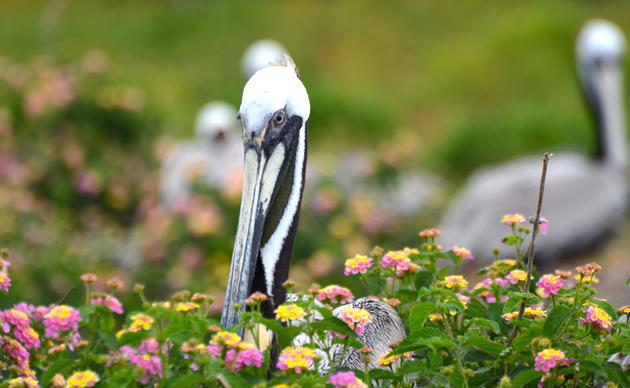White Ibis
White Ibises are known for frequent shifts in roost and colony sites, substantial dispersal and migration distances and variable breeding seasons.This flexibility enables the White Ibis to exploit changes in freshwater habitats to better utilize shallow water feeding areas. The White Ibis nests on barrier, marsh and spoil islands on the coast, on islands in lakes farther inland and in stands of trees within marshes and mangrove swamps. Nearby freshwater feeding sites are vital during the nesting season to coastal colonies, as nestlings cannot develop normally on brackish water crustaceans.
White Ibis may feed in nearly any shallow water or on land in soft substrate or ground vegetation, taking prey from the surface of the ground, buried in the soil or within rooted or floating aquatic plants. They prefer to forage in water 5-10 cm deep, typically less than 20 cm. Nest failures have been reported in Florida when rising water causes prey to disperse and poor foraging conditions, resulting in abandonment of entire colonies or sections thereof. Nesting begins when conditions are best for effective foraging, primarily the availability of sufficiently shallow freshwater wetlands to produce high prey availability. Colony sites usually develop from roost sites through the formation of daytime bachelor parties that form nearby, though where the white ibis nests with other species the presence of other nesting individuals may prompt use of an area. The species will nest in live or dead woody vegetation, occasionally in herbaceous vegetation and height may average 3.65m to 0.14 m off the ground across its range. Disturbance at colony sites is a key factor in nest failure for this species.
For more information on White Ibis, including identification tips, visit their page on the Cornell Lab of Ornithology.
Text References
- Frederick and Collopy 1989
- Gawlik 2002
- Heath et al. 2009
- Herring 2008
- Johnston and Bildstein 1990
- Kushlan 1979
How you can help, right now
Join Audubon Texas Today
Becoming a member supports our local work protecting birds and the places they need.
Consider a Legacy Gift for Texas
Planned gifts and bequests allow you to provide a lasting form of support to Audubon Texas.
Subscribe to Our Newsletter
Subscribe to our newsletter for updates about Audubon Texas's conservation work, and news about our activities and local events.




